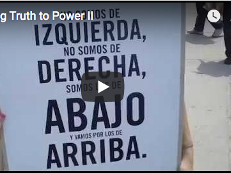I thought that Dawson’s emphasis on the advent of radio being pivotal in Peronism to be on point. Without being able to broadcast her voice, Evita Peron would not have achieved the level of support she enjoyed. Interesting that she … Continue reading →
Posted in Blogs, Week 10 | Tagged with Argentina, class, Evita, Music, Peronism, politics, radio, Samba, Tango
It seems to me that there are really only three paths to political power. You can listen to your voters, and honestly try to represent their interests; you can convince your voters that you will look after them, but serve your own (or your parties!) interests first; or you can disregard the will of the […]
Posted in Blogs, Week 10 | Tagged with Perón, politics, populism
It was incredibly interesting to read Dawson’s document about Maria Peron, and the power of the radio in Latin American society. In a region where many people have strong political views that can sometimes be expressed through violence, the leaders of these nations are the source of their fire. Maria Peron, although a woman in […]
Posted in Blogs | Tagged with People, Perón, politics, Power, radio
This week, we learned about populism, politics, and how the introduction of media influenced Latin America. The reading this week was very interesting to me. It mainly focused on a more relatable era, with the use of radio and communication, which definitely appealed to me. It also covered a new political group which I had […]
Posted in Blogs, Week 10 | Tagged with Evita, media, Music, Peronism, politics, Populist, radio
This week, we learned about populism, politics, and how the introduction of media influenced Latin America. The reading this week was very interesting to me. It mainly focused on a more relatable era, with the use of radio and communication, which definitely appealed to me. It also covered a new political group which I had […]
Posted in Blogs, Week 10 | Tagged with Evita, media, Music, Peronism, politics, Populist, radio
This week study discusses the term modernity and explains the progression of Latin America in order to become a modern society. As discussed in the video, modernity has 4 key components: Innovation Liberation Secularism Universalism In my opinion innovation is the first step towards modernity. Particularly, innovation in industry is an important factor in the […]
Posted in Blogs, Week 7 | Tagged with innovation, modernity, politics, secularism
Sorry for the couple hours delayed upload- I have managed to break my laptop, tooth and phone all within the span of one week
This week’s lecture’s were focused entirely on Modernity and the concept of modernization and what it means to us. Modernization can be defined as the process of a change in development when it comes to social aspects, political and economical aspects. Throughout the 1880’s I discovered that countries experienced a lot modernization- in Western Europe, Latin America, North America, and Africa.
Paying specific attention to Latin America and the kind of images that were depicted on Modernity- it seems to me that they all expect us to look and act as people in the US. You are considered modern in todays world if you look like US- when it comes to dressing, technology and all other aspects. Without a doubt- the world will soon turn into America because that is the most “ideal” form of Modernity. God forbid we start thinking like Trump which I pray never happens.
Nonetheless- with regard to Mexico- the president Diaz brought so much into the country with references to wealth, dressing, medicine, health. He began restructuring the economy- and this called for huge booms in economic development and improvement of transportation. Not only was life much quicker during this time but it also increased the amount of exploitation of the natural resources by luring foreign capitals to invest in Latin American countries and it’s agriculture at the time
Diaz may have brought in a huge stability with regard growth in Mexico- but this can be counter argued in so many ways as many people over look the gap that it created within the rich and the poor. Diaz’s method of ruling was dictatorship and left no room for political advancement or opposition .
The lecture also talks about the ways in which religion, Dawson, secularism- and talks about how Christianity was introduced into Mexico- in several ways the catholic churches imposed themselves onto the Mexicans and left little to no room for choice dictating exactly the way people should live their lives.
My question for this week will have to do on the relation of Diaz and modernity- could he really be considered a positive impact of Mexico if he caused such a huge divide between the upper and the lower class and did not allow for formal opposition?
Posted in Blogs | Tagged with christianity, church, Dawson, Diaz, export, modernity, politics, secularism, Stability

